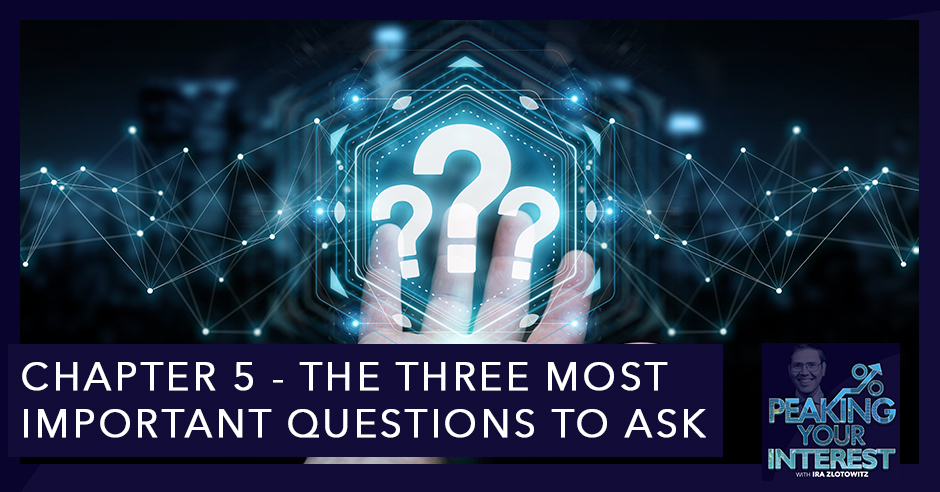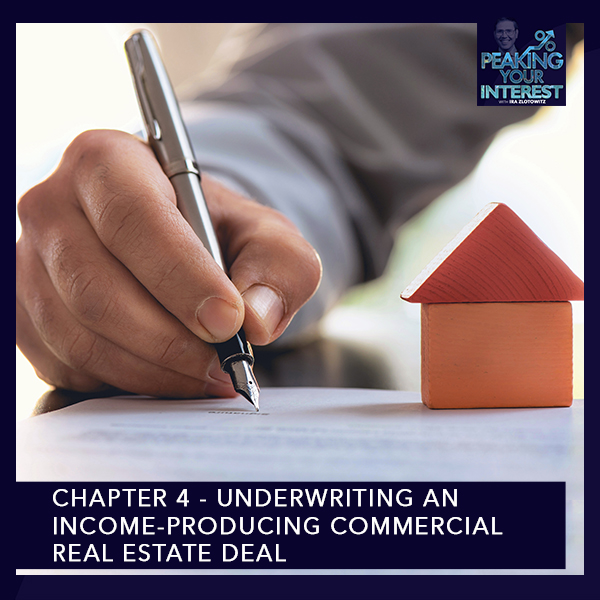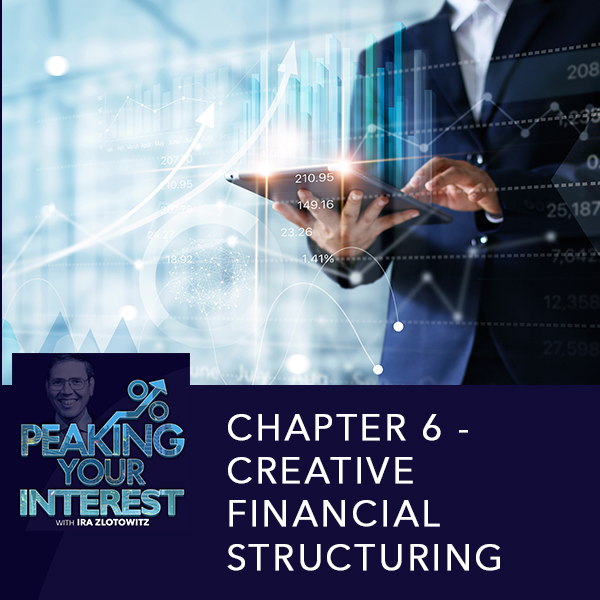Chapter 5 – The Three Most Important Questions To Ask
- On March 23, 2020

In real estate, you will only make money when you close. That is why doing your due diligence will keep you from wasting your time on deals that can’t be completed. In this episode, host, Ira Zlotowitz, breaks down the three most important questions to ask your investors before considering a deal with them. No matter how great the deals seem to be, when they are not with the right investors, at the right price, and with the returns you need, then they won’t matter in the long run. Tune into this great episode to learn how to make good use of your time investing.
—
Listen to the podcast here:
Chapter 5 – The Three Most Important Questions To Ask
We’re going to do Chapter 5, The Three Most Important Questions to Ask. Why do I call it The Three Most Important Questions To Ask? I want to make a statement that’s going to come off like I’m bragging, but it’s not about bragging, it’s about life’s experience. There’s one thing that I’d like to say that I’m better than anyone else at. I am better at reading what it’s going to take for a deal to be had or more importantly, a deal to break because I don’t waste my time. For example, you have an attorney. How does that attorney make money? He’s trying to make some money by the hour. If you call up an attorney and say, “I need to find something out. Should I buy this deal? I want to do this transaction,” and you want legal advice. They spend five hours, whatever their fee is, they take that fee and it’s multiplied by the hour in order to move forward.
In other jobs as well, it’s hourly. You got billed by the time. The nature of my business as we stand is that I don’t get paid by the hour. I get paid for completion. It’s called a success fee or a commission. At the same token, if you’re looking to buy real estate, you’re in the same business as me. You will only make money when you close. You spoke about things. You could have a risk of time, sweat equity, different things. Over here, my experience is I only make money when I close. I have to make a decision every day. Should I take on this assignment? Since I’m only going to make money, when and if I close, I don’t take on any transaction unless I believe it’s a high-probability I get to the closing thing. It’s even worse for me sometimes. I have to make a decision, “Should I spend money going to a client, flying to meet a client? Is it worth it enough to go to a show, spend money on a show, do an event, marketing something to see should I hire somebody new in the event that more business will come and it’ll turn out to be close and I’ll make my money back?”
Therefore, I’m trained in the art of not wasting time because I don’t make money at that time that I wasted. I only make money if I close. What I want to bring back to you and I could have started the real estate course with this. It was a big debate. When do I bring this up? I decided this is the right time to bring it up because this is where you could at least have an appreciation of some level of real estate to understand why these questions are. These are the three questions, keeping it simple.
Three Most Important Questions To Ask
Number one, how much equity are you and your investors willing to put into one deal? This is the most important question because you want to know what size of a deal you could even look at. You hear someone, “Are you buying real estate?” “Yes.” “What are you buying?” “Any good deal, I’ll invest in it.” “Do me a favor, could you give me a good deal?” Before you even get to the word, good deal, before you get to what return you need to see, you have to start with how much money do you have. As a mortgage broker and getting involved in assisted to come in and raise equity, I could tell you how much money you’re able to get from the bank.
If you’re buying a building, let’s say for $1 million and can only get a mortgage of 75%, $750,000. Aside from closing costs, you need $250,000. If between yourself, your friends and family, you can’t put up more than $200,000, you cannot buy that $1 million building. If you come up with $500,000, you have the ability to buy a building potentially up to $2 million. Therefore, instead of wasting your time about anything else, even if it was a great deal, how much is the most I could go ahead and borrow? How much can you raise, you and your partners combined?
If you're looking to buy real estate, you will only make money when you close. Click To TweetYou can have two buckets. If it’s an amazing deal, I could raise $500,000. If it’s not an amazing deal, but a good deal, I could raise $250,000. A bad deal, you can’t raise anything. You could not buy in a bad deal. At least you know your range. Your starting point is question one, before I even start, how much money can I come up with? Number two, what return do your investors need? Is that an annual basis, which is called cash-on-cash return. Is it IRR, the average return over the lifetime value of money? Is that how it’s going to work? Is it a multiply? What is the metric that they use to figure out if the deal makes sense, which what return they need?
Here’s an example to understand the difference. If I meet someone that says, “I need a 12% return on my money. I have a deal that’s throwing off 10% at year one, 12% at year two, 14% at year three.” It averages 12% but it’s not 12/12/12. It’s 10/12/14. Someone said, “I’m sorry I can’t invest.” Why? I need twelve from day one and it’s ten in the beginning. Even if it’s going to go to 16, 18, 20, another person says, “I need an average of twelve.” Some people need money back upfront. Find out what terms you can go ahead and get this money in.
I should have brought this up when I started the question one, but it doesn’t change question one. The third question is how much leverage will the investors that you’ve put on it deal? This is an important question. I’m buying a building for $1 million. Someone tells me, “I’ll invest in any good deal.” I’ll put up $100,000. Am I willing to invest in a deal that’s $1 million purchase, $900,000 worth of mortgages? Therefore, if there’s something goes wrong, a drop at the property, I can be wiped out or I want to go into a deal as a buffer.
I want to go into a deal that we don’t get wiped out. It’s possible that something goes wrong, but I only have a $750,000 mortgage. If I take a loss, I’m safer. There’s less debt, the banks before me. What’s crucial over here is by putting these three things together will allow you to come up with what size deal can you buy? As long as it’s throwing off what kinds of return. One of the main reasons, that was the push for me to redevelop the Eastern Union app to come out with this full underwriting ability that someone is a layman. You’re sitting at home. It’s your first deal. You get a set up from a broker and you say, “Let me work on this. What does it throw off to return?” My investor told me in order to be able to allow you to answer these three questions and tied into the deal without spending too much time.
That’s why I developed that E-calc features on the app to be able to do with the full underwriting. You can could go meet someone and say, “You need a 12% or 10% and you cannot find that if you’re buying a deal at the right price based on the cap rate than other parts of the real estate term, but also throw off the return and link it together.” Also, through the process, many times what makes the difference? What happens in midstream? You’re talking, “I found the new bank.” We have two options. One bank will give you 80% but the rate is higher and one bank will give you 75% at a lower rate. Which one is a better deal? There’s no right or wrong answer in that context. If you need more money, you have no choice.

Questions To Aks Investors: Even as the world keeps evolving and everything is all online, the fundamentals are still going to be the same.
How To Find A Deal
If you don’t need the money, obviously pay a lower rate. If you’re taking into account what returns you need, you may decide to go with one offer because that’s going to throw off a better IRR, better cash-on-cash to the borrower at that time. You always want to constantly get these three things because as we move further in, how do I find the deal? You’re finding a deal, four different ways. It’s an old school and the new school. There are only two ways. Is he getting a deal directly from the seller? You meet a seller who tells you, “I’m selling my building,” or are you getting it from a sales broker who got the listing from the seller? The difference is in 2020 and beyond, the social media, whether it be LinkedIn or whatever other course of social media that you’re involved in.
LinkedIn is the number one for businesses. There’s already a real estate trading hands there or online listings, different sites that broker and sell these properties online. You’re ultimately going to be feeding up in commercial real estate to a person in the end that’s going to have the confidence that they should work with you. When you’re going to start in any of these conversations, the starting point is that someone wants from you in a relationship is they want to be able to have a trust. You’re not going to waste the time. They also like me get paid and yourself when we close. I don’t make money if we don’t close. You don’t make money neither does a sales broker.
No one wants to waste their time. If you know upfront that the most money you could come to the table at any given moment is with $500,000 and the people you’re investing with allow you to take a mortgage of up to 75% or 80%. That would mean you could buy a $2 million building. Your phone call should be, “I don’t care how great the deal. I can’t buy anything above $2 million. If you have something $2 million and below, I want to work with you.” You’re going to not see a lot of deals, but what’s the difference? Why do you want to see a deal for $2 million, $4 million or $20 million that you anyway can invest because you don’t have enough equity put into the deal?
You’d rather draw a line and be firm. When I meet sales brokers and I talk to them all the time, they say they can’t deal with this person. This person only wants off-market deals and tells me, “I will listen to everything.” You can’t be listening to everything. There has to be a box. Someone told me a long time ago, I came to the business with a great piece of advice. Most people think the first choice if you asked the question, is a yes, second is a maybe/ I’ll try and third is a no. That’s not the right order. It’s yes or no. Maybe I’ll try at least. You want to give a yes or no? Come up with a clear line.
Off-Market
I am looking to buy a deal for $2 million. Everything else can be a discussion. It’s possible that even though you only wanted to buy multifamily, someone comes out with a great commercial property or a great something else, you might say, “I can listen.” One thing you can’t change on, if your price point, do you have enough money to buy a $2 million deal is all you have. You’ve got to come forth. At least, you’re building your relationship with these four buckets. People say a lot of times to me the word off the market. I’m thinking to myself, “The world is going to change. It’s going to keep evolving.” People are going to maybe feel dealing less with a broker, less with a person. It’s all online.
If you're selling a property, bring it out to the marketplace. Let the world see it. Click To TweetThe fundamentals are going to be the same. The systems and the people want to know they could deal with some of that could close and you want to find that as much as possible. What is your box before you start? Not at the end. Let’s even talk about the different direct deals via a broker. Direct means whether through an online listing service, through social media, but direct versus sales broker. People have this concept called off the market. I’m going to tell you my two cents here. It might not be popular with a lot of brokers out there, but as one client tells me all the time, “I try to buy off-market and I sell through a broker,” which is saying I try to find a sucker who’s going to sell his property by taking it out to the market and checking out the full price.
When I sell a property, I flood the market. When I came into real estate many years ago, everything was very secretive. Everyone believed that if you’re going to tell people you’re selling the building, the value is going to go down. You won’t get the max price. I found that as I went through everything over all these years, the wind keeps blowing further and further in this direction is you want to get the best price. Let the most eyeballs see the property. There’s no such thing as off-market. An off-market deal can’t be if you’ve got an off-market deal from a broker. If there’s such a thing as an off-market deal, it means you know an owner who wasn’t selling the property, you met them, they didn’t tell anyone else, just you, “I’m selling my property and if you pay me, this price is yours,” that’s the only market.
Anything sure that it’s not off the market. It might be a quieter listing, but if you’re selling a property, bring it out to the marketplace. Let the world see it. There are many crowns. There are many different sources of equity, people and buyers all over the country. You could normally have said, “My building is in Texas. I only send that to Texans.” All over the world people could buy it. With technology, you have access to data and Octavia as a company, a data provider. They give you information all over the country. They have googled every little service provider. I don’t want to mention names because I want to be in a situation where you’re going to read this and when you see that video, “Let me tell you what the company I mentioned,” it doesn’t even exist anymore, but the concepts always exists.
We’re living in a world where everything is open. The world of everything is open and more transparent. If you’re selling a deal, you want to try to put it onto the marketplace. Somebody asked me a good question, “If that’s the case, how am I going to find the deal that’s been on the market?” What I found who gets the best deals are the people that babysit the deal that they’re looking for. Here’s what typically happens in a scenario. This person decides to sell a $10 million building. In his mind, he says, “If I could get $12 million, I would sell it.” That’s where it starts. A broker hears that and calls him and says $12 million. They bid on it.
Some sales brokers are more realistic. Is it possible to get $12 million? Another broker says, “Never get more than $10 million.” Different styles that they take on the assignment, but ultimately a deal goes on the market for $12 million. What happens? That sales broker sends it out to his core clients first. The core clients know the real estate is not worth more than $10 million. They go for $10 million. The broker says, “I’m sorry, no.” They went back to the seller. The seller rejects it. This deal starts getting onto the broader market. This deal will be on the market.

Questions To Aks Investors: If the cap rate is the number you want, then you know you could stop making the bid.
You can take a site like LoopNet and people say, “LoopNet? It must be a piece of garbage.” I don’t necessarily believe that. I know people that buy real estate in LoopNet. If they do as they say, “This person burnt out all the real people because he was selling it for $12 million. I’m going to look at it anymore.” If you stay in touch with that broker, you’ve tracked that listing and you have your price. I’m sure as soon as it dips below a certain number, they’ll trigger and make a phone call to you. I have no doubt that as time goes on, there will be sites that will have this type of feature built-in. You could probably put a bid on every property in the United States with AI machine learning.
I have no doubt, that exists out there. It’s a matter of when it’s going to be public access. You can tell this system the types of deals you like and your underwriting and it’ll come up with a price like Zillow could price a deal and give an estimate of sale. Put a notification that if the price hit the market below a threshold, it should notify you and let you know. That’s what helps people get the best deals. They date this broker. Instead of time to go to hell, the guy is being unrealistic. They say, “I’m not there yet. Let’s babysit.” They’ll circle back at the broker.
A couple of months later, is the guy still at $12 million? No, he came down to $11.5 million, but don’t forget he signed a new lease. Even your $10 million number, you should probably be comfortable at $10.3 million. You’re not $2 million apart. You’re less. As time goes on, there could be that one moment where the seller says, “I decided I want to sell.” They turn to the sales broker and said, “Who someone interested that knows his deal.” Who knows it? The guy dating it since you listed it several months ago. They’re going to go ahead and move forward from there.
What are the steps you take when you’re sent a new deal? You have the frame of reference. You know how much you could buy a deal for up to $2 million. You have someone come to you and says, “Here’s a deal that matches your bucket.” What is the first thing you do? The first thing you have to do is balance. You have to apply a capitalization rate. A cap rate is an annual return in relation to the purchase price expressed as a percent, assuming you bought the building all cash. If you bought this building for all cash, what return would you be making on this building? You have to NOI the profit.
This shows you the value of the building. I’m not explaining to valuations and it’s irrelevant, to be honest with all of you. You don’t have to understand valuations. As far as you’re all concerned, that’s a number. Whoever your guru is will tell you that in this neighborhood, if you’re not earning at least a six cap, equivalent of 6% return, assuming you bought it all cash, don’t buy this deal. It’s very simple. The first thing you have to do if your number is $2 million and let’s say your cap rate is 10%, you have to find a deal that’s throwing off at least $200,000 in NOI because otherwise, you’re wasting your time. If you’re not buying a deal that has a $200,000 NOI, you’re putting a cap rate of 10%, gives you a value of $2 million.
Let the most eyeballs see the property. There's no such a thing really as off market. Click To TweetUsing an easy cap rate calculator, the Eastern Union app, it’s very simple. NOI, put the cap rate, then the total value. Once you find it, that’s your number you’ve got to go with. You find that at least you know you’re buying the right price. From there, the structure could decide the return. I want to point that interestingly enough. I would not have pointed this out years ago. It’s not fully there yet, but I see this thing trending in this direction. Since the world is moving to financial engineering, which means what are the returns? Think about the questions I told you to ask. What return does your investor need?
What I’m finding in certain people, if they are getting long enough financing, they may go and overpay for a building if the building has a better cashflow return. For example, this building in this neighborhood should only be worth $2 million based on the cap rate, but they are willing to pay $2.1 million for this building or go to a different name and paid $2.1 million. On this building, based on the lease in place and the financing you could get, it works out that the return is going to be 13% and all your investors are happy at 12%, so you still go to 13%. I tell people to understand the value, they look at me like I’m crazy. I’m not the one making this up and saying where the world’s going to.
Look at the people and say “You’re going to do that, are you nuts? It’s not worth $2 million.” I go, “What’s the difference between what it’s worth?” The bottom line is I’m making 13% on my money. Every other deal that I would buy is only 12% on the money. I don’t mind overpaying. I’m not selling it. I’m keeping it for the next several years. In years, bouncing the mortgage down that low. This conversation piece is that I’m finding it’s shifting. We are moving from caring about what you used to be cap rates and cash-on-cash to bottom line is what’s the IRR. If the return I’m going to make over the life of the investment is fine, I don’t mind overpaying. The starting point is if you get a deal, you have to make sure that the cap rate is right.
If the cap rate is the number you want, you know you could stop making the bid. You’re not going to overpay. You want to go through basic underwriting. If you’re using the Eastern Union app, the new E-calc feature on it where could fully on the right the deal then it pays. It takes less than five minutes, plug in the numbers from the broker setup or the seller setup. Plug it in with some of your assumptions and it will tell you what the cap rate you’re using. It will tell you the cash-on-cash. It will tell you the IRR. It will tell you all the splits you need. In two steps, you now know the first steps take you less than a minute to calculate the cap rate. The cap rate is good. Do the basic underwriting.
If these two things match up, you want to do due diligence and it becomes life on its own. It’s been a whole topic, a whole discussion, but that’s what you want to do due diligence. Going back to the concept of the beginning of this chapter, the three most important questions. I meet people who don’t even start with three questions, it’s worse. They start getting deals. They get into their car, drive around and look at buildings. Take a look at ten buildings. I said, “You like the building. If you come back and the building is selling for $2.2 million, irrelevant. You can’t buy it because you don’t have equity or the building is selling for $2 million, but it’s trading at 5.5 cap and your valuation shouldn’t go less than a six cap or any other issue under the sun.
You could have found that in the underwriting. Why in the world did you drive and waist your time? This is what I do, and I want to train all of you is as much as possible, not just in the real estate and the way you should approach it is don’t waste your time. Reverse engineer it. Do the things that you could do in your house quickly and knock things out. When you go out, if you’re spending time and doing a site visit on only five properties versus twenty properties, you could spend more time. That becomes part of your due diligence step to go ahead and work it out there. Thank you.




0 Comments